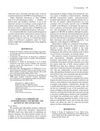 November 2011 in “Pediatric dermatology”
November 2011 in “Pediatric dermatology” Marie-Unna Hereditary Hypotrichosis is a rare genetic condition causing sparse hair growth, requiring specific recognition for proper care.
3 citations,
January 2012 in “Journal of cosmetics, dermatological sciences and applications” Many Iraqi patients had skin problems at the site where a vein was taken for heart surgery.
 September 1997 in “JEADV. Journal of the European Academy of Dermatology and Venereology/Journal of the European Academy of Dermatology and Venereology”
September 1997 in “JEADV. Journal of the European Academy of Dermatology and Venereology/Journal of the European Academy of Dermatology and Venereology” The document concludes that treatments like oral anti-androgens, minoxidil, and topical spironolactone can be effective for hair loss in men and women.
August 2021 in “Indian dermatology online journal” A young boy with a rare skin and nail condition improved significantly with simple topical treatments.
 August 2023 in “Asian journal of pharmaceutical and clinical research”
August 2023 in “Asian journal of pharmaceutical and clinical research” Intense Pulsed Light is an effective and safe hair removal method for people with excessive hair growth.
 November 2013 in “John Wiley & Sons, Ltd eBooks”
November 2013 in “John Wiley & Sons, Ltd eBooks” The document concludes that accurate diagnosis of male and female gonadal disorders is crucial for effective treatment and better patient outcomes.
 1 citations,
November 2015 in “Lʹvìvsʹkij klìnìčnij vìsnik”
1 citations,
November 2015 in “Lʹvìvsʹkij klìnìčnij vìsnik” Correcting trace element imbalances may help reduce alopecia areata symptoms.
 92 citations,
November 2003 in “The Journals of Gerontology”
92 citations,
November 2003 in “The Journals of Gerontology” Testosterone supplements can increase muscle mass and strength in older men with low levels, but long-term effects and risks need more research.
 10 citations,
November 1997 in “British Journal of Dermatology”
10 citations,
November 1997 in “British Journal of Dermatology” A 10-year-old boy had the earliest reported case of hair that became progressively kinkier but eventually returned to normal on its own.
July 2013 in “Indian Journal of Dentistry” A 46-year-old man showed symptoms of a rare condition usually seen in postmenopausal women, highlighting the need for dentist-dermatologist collaboration.
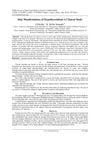 6 citations,
January 2013 in “IOSR Journal of Dental and Medical Sciences”
6 citations,
January 2013 in “IOSR Journal of Dental and Medical Sciences” Most people with hypothyroidism have skin problems like dry skin and hair loss.
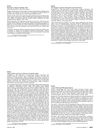 February 2011 in “Journal of the American Academy of Dermatology”
February 2011 in “Journal of the American Academy of Dermatology” A 60-year-old man with a long-term balding condition also developed a rare hair loss condition usually seen in postmenopausal women.
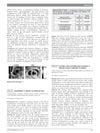
Systemic lupus erythematosus is diagnosed earlier in males than females.
 12 citations,
October 2004 in “Experimental Gerontology”
12 citations,
October 2004 in “Experimental Gerontology” Changes in testosterone and estrogen receptor genes can affect how men age, influencing body fat, hair patterns, and possibly leading to skin disorders.
 48 citations,
January 2011 in “International journal of trichology”
48 citations,
January 2011 in “International journal of trichology” Intralesional triamcinolone acetonide is the most effective treatment for localized alopecia areata.
76 citations,
January 2011 in “Indian Journal of Dermatology/Indian journal of dermatology” Dermoscopy is a useful tool for diagnosing and managing alopecia areata.
84 citations,
April 2015 in “Cosmetics” Hair dyes vary in how long they last and how deeply they penetrate hair.
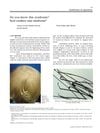
The document concludes that Loose Anagen Hair Syndrome is a benign condition where hair is thin and easily pulled out, often improving with age.
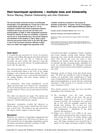 21 citations,
July 2005 in “European Journal of Emergency Medicine”
21 citations,
July 2005 in “European Journal of Emergency Medicine” Hair-tourniquet syndrome can cause serious toe injuries in infants but can be treated if found early.
12 citations,
January 2015 in “Skin appendage disorders” Dermoscopy helps quickly identify hair breakage in people of African descent.
 March 2024 in “International Journal of Dermatology”
March 2024 in “International Journal of Dermatology” Baricitinib improved nail condition and hair regrowth in a patient with alopecia and nail abnormalities.
 January 2015 in “Dermatology online journal”
January 2015 in “Dermatology online journal” A man with total hair loss also developed a rare nail condition, likely due to autoimmune issues.
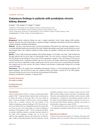 11 citations,
March 2016 in “Journal of the European Academy of Dermatology and Venereology”
11 citations,
March 2016 in “Journal of the European Academy of Dermatology and Venereology” Almost all patients with chronic kidney disease not yet on dialysis have at least one skin problem.
 1 citations,
April 2022 in “Journal of The American Academy of Dermatology”
1 citations,
April 2022 in “Journal of The American Academy of Dermatology” Hair loss in men (androgenetic alopecia) is significantly linked to decreased scalp sensitivity, but not temperature sensitivity. More research is needed to confirm this. Comparing this hair loss to leprosy is unsupported and stigmatizing.
 2 citations,
August 2014 in “Archivos argentinos de pediatría”
2 citations,
August 2014 in “Archivos argentinos de pediatría” A 6-year-old girl with Turner syndrome also had psoriasis, alopecia areata, and trachyonychia.
 September 2008 in “Fertility and Sterility”
September 2008 in “Fertility and Sterility” Exposure to fatty acids significantly increased androgen levels in female dogs, suggesting a link to conditions like insulin resistance and PCOS.
 14 citations,
July 2015 in “Journal of Cosmetic Dermatology”
14 citations,
July 2015 in “Journal of Cosmetic Dermatology” Sebaceous glands in male pattern hair loss patients have more lobules and might cause early hair growth phase shifts.
 37 citations,
January 1987 in “Dermatology”
37 citations,
January 1987 in “Dermatology” Minoxidil stimulates hair growth by increasing hair thickness and prolonging growth phase.
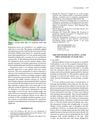 8 citations,
January 2008 in “Pediatric dermatology”
8 citations,
January 2008 in “Pediatric dermatology” Hair gels may cause split ends in children.
34 citations,
June 2015 in “Journal of cardiovascular pharmacology and therapeutics” Direct vasodilators and sympatholytic agents are still useful for certain conditions despite being less common due to side effects and newer drugs.























